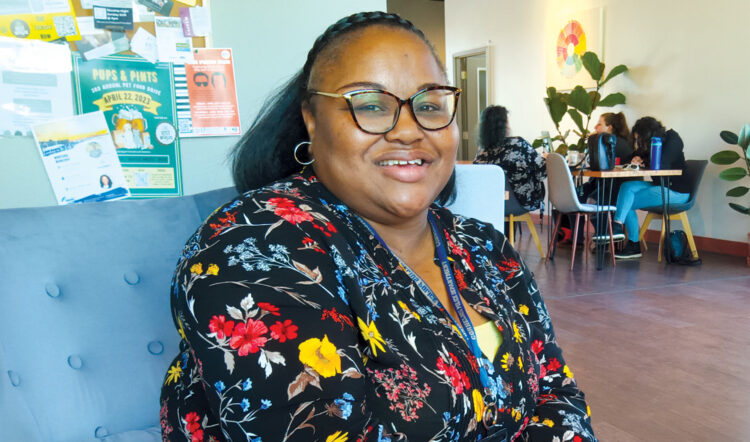
Gina Patterson is the lead CPD detective on the Madalina Cojocari case \ Photo by Dave Yochum
PROFILE | By Dave Yochum
May 3. Madalina Cojocari was last seen five months ago, causing an outpouring of concern not just in Cornelius, but all over the world.
There are a dozen Facebook pages where members try to crack the case.
The posts are not as frequent, but her 12th birthday was observed at the Police Station April 11.
Gina Patterson, the lead CPD detective was there. She’s still on the case after sleepless nights, joint searches of Madalina’s home with the FBI and SBI—and prayers.
Patterson and the Madalina team have followed up on literally hundreds of tips that continue to come in.

Madalina Cojocari
“At least two a week at this point, and we follow up on them,” Patterson said. Madalina is not a “cold case” as the tips are still meaningful and viable. She won’t disclose the nature of the tips however.
The 47-year-old veteran CPD officer—she began on patrol 20 years ago—talks to the SBI and FBI about the Madalina Cojocari case virtually every day.
Madalina’s mother and step-father, Diana Cojocari and Christopher Palmiter, have been charged with failure to report the disappearance of a child, a felony.
She has interviewed Madalina’s mother, but Patterson, a detective for seven years, would not say what her impressions are of the mother.
Madalina was last seen on surveillance video getting off her school bus outside her home in Victoria Bay and has not been seen since.
It all makes no sense, and theories abound. For Patterson, it’s about facts—and a little girl.
But Madalina is one of eight cases she’s working on now.
Generally speaking about a third of her case load is financial-related, with a mix of internet crime, spouses not coming home and larcenies.
On investigations, she said, collaborative thinking helps, talking with other law enforcement officers about the cases they’ve worked and the problems they’re facing on new ones. “There is always something new, you never have the answer and it’s not a perfect science,” she said.
Team work is good work
When she was a child in Placentia, CA, Patterson wanted to go to law school or medical school but her mother was a single parent with limited resources. They moved here while Gina was in her senior year of high school where she played basketball and ran track and field.
She likens good police work to team sports: “Work together as a team and making good decisions.”
After starting at Johnson C. Smith, Patterson got a bachelor’s degree in criminal justice from UNC-Charlotte and briefly went into loss prevention at Belk until signing on with CPD.
After two years on patrol—and driving those powerful Crown Vics on various pursuits, once all the way into Charlotte—she became a school resource officer at Cornelius Elementary and JV Washam Elementary, then went back to patrol before being promoted to investigations.
One of the biggest challenges facing law enforcement is retention and recruitment within police departments. In a 2021 survey by the Police Executive Research Forum, law enforcement agencies reported an 18 percent increase in resignations and a 45 percent increase in retirements compared to the previous year.
Cases like George Floyd and Breonna Taylor resulted in anti-police sentiment and demonstrations nationwide.
“Police work can make many officers a bit jaded, but I try to remain positive. I got into this line of work to help others and make a positive impact on the community. In order to remain positive I’ve learned to not take my work home with me. With this job you have to have an outlet. I do my best to decompress and practice self care. When I’m refreshed I can work the next case with peace of mind and clarity,” she said.
Patterson enjoys shows at the Blumenthal and concerts.
She’s also funny.
About the Lake Patrol, she deadpanned: “I like boats, but I’ll take a cruise.”
More than one hat
Patterson is inclined to stick to the basics and reflect on the training that was part of being a patrol officer.
“The Patrol Division: That’s your basis to learn how to talk to people—I’m not very talkative—to read people and problem solving,” Patterson said.
One of the big challenges in police work is the fact that officers are often thrust in the middle of domestic situations or situations where a doctorate in psychology if not psychiatry might be best.
“You have to wear a lot of different hats; marriage counselor, parental advice,” Patterson said.
In two decades on the force, she’s never fired her weapon except to practice and to qualify. As a woman and an African American, she said she’s always been treated right in Cornelius.
“I’ve been here so long you know. I don’t want to say I’m one of the guys, but I think we all click. I haven’t had the experience ‘oh you can’t do that you’re female.’ I haven’t had any issues of racism or sexism or any of that,” Patterson said. “A lot of departments you can’t say that. We’re good.”
“I enjoy taking to people…’how can I help you,’ for example. If I have to spend extra time helping resolve an issue, I’m going to do it. I don’t want you to have to call us back…I’m making sure they have the resources that are needed…I’m all about saying these are the resources…I can’t always resolve the issue but we do have resources,” Patterson said.
One thing that’s annoying are the “experts” next door. “I call it the CSI effect…’well, on CSI, they did this, they did that.” Patterson grinned and rolled her eyes.




